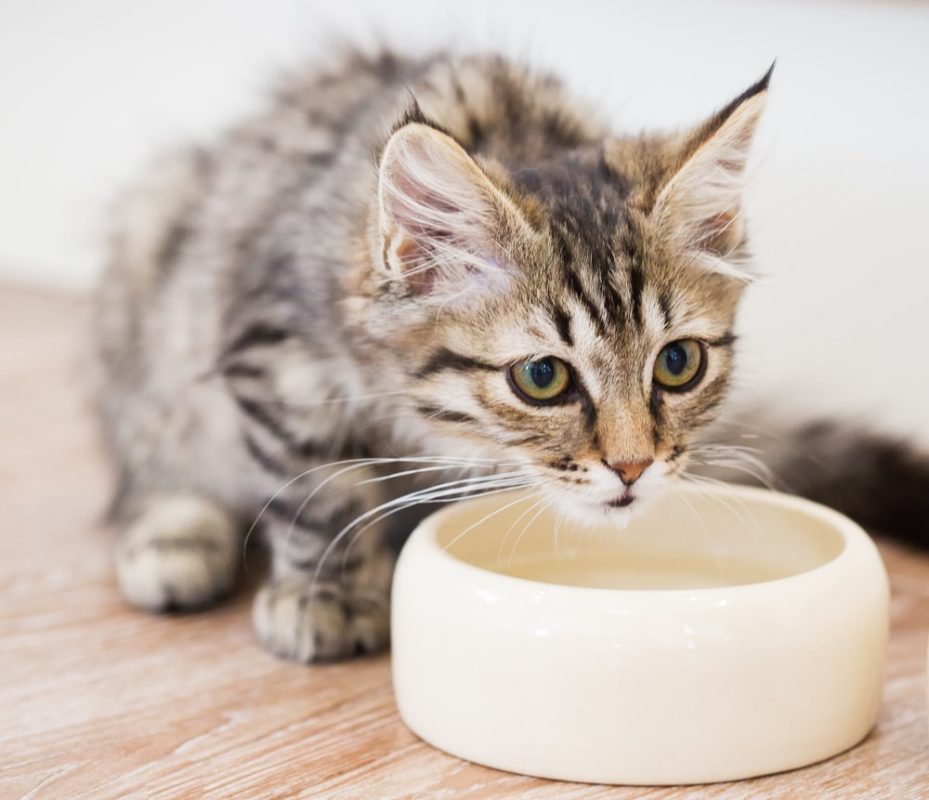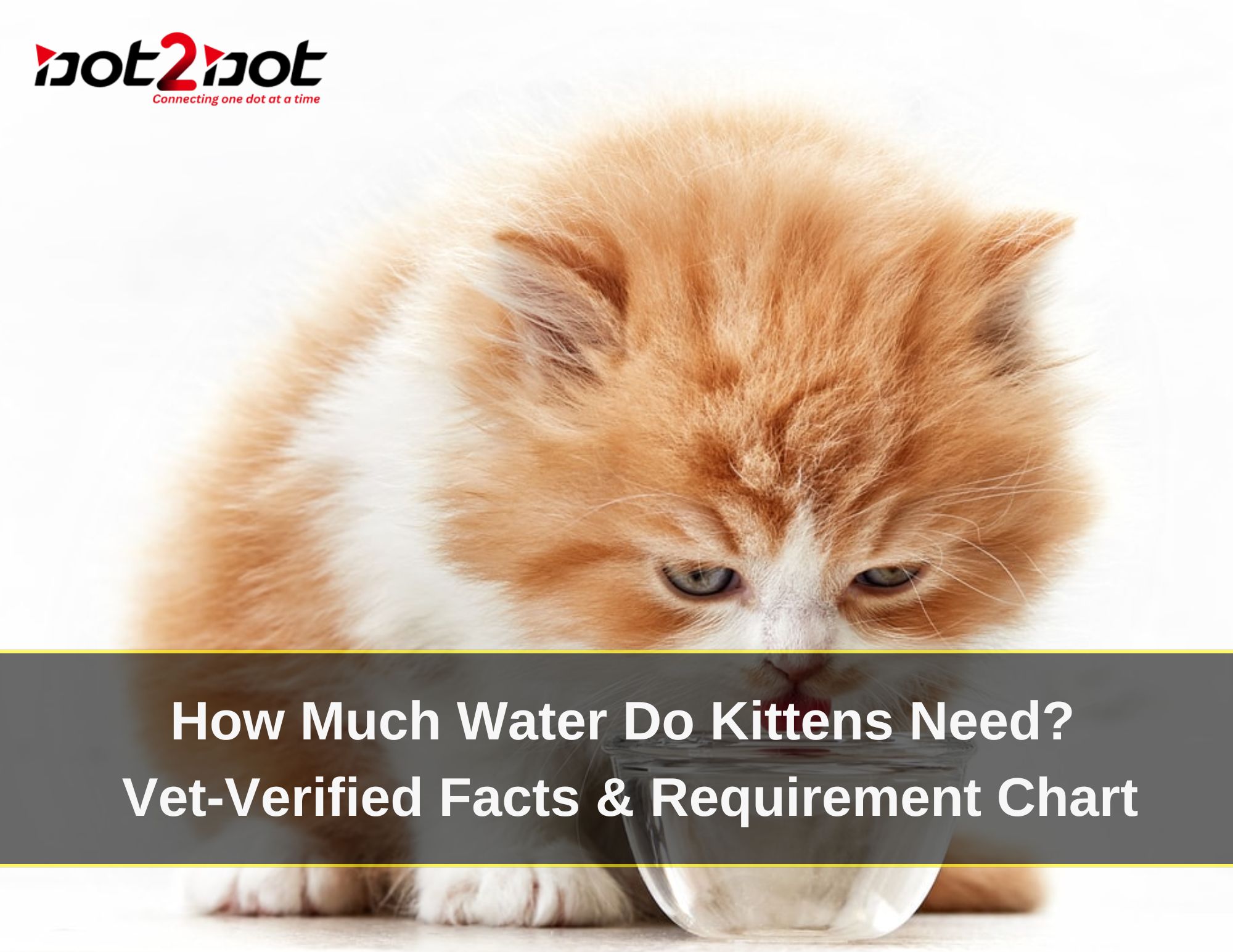When you bring a kitten into your family, it is only natural to want to provide them with the best care. You ensure they have the best quality food, a warm and comfortable sleeping spot, and a water bowl to ensure they stay hydrated. But you may be unsure how much water your kitten needs, which is a good question to ask since water is essential for their overall health and well-being.
The daily recommended water intake for cats is around 0.9 fl. ounces (28ml) of water per pound of body weight, which is not a lot for a very young kitten. Your kitten’s water requirements will also be determined by its development, age, climate, activity level, and diet.
Do Kittens Need Water?
Chances are your kitten is already weaned by the time you bring them home unless you breed cats or care for an unintentional litter of kittens. If your kitten is weaned, they will eat kibble, wet food, or a mixture of both. For the first few weeks of their life, kittens will live off their mother’s milk, but once they’re weaned, it is a good time to introduce water to ensure they are properly hydrated.
Kittens are vulnerable at such a young age, and their water mustn’t be contaminated. You can ensure your kitten is receiving the best water by filtering your water from the tap. However, because kittens have a propensity for dozing off in dishes and other strange places, introducing water to them at an early age can be risky. So, putting out water for your kittens when they are too young can put them at risk of drowning.
For this reason, it is much safer to have a couple of shallow dishes of water available rather than one deeper bowl, at least until you are confident that your kitten isn’t going to take a snooze in their bowl!
How Much Water Do Kittens Need?
Very young kittens still drinking their mother’s milk won’t need water until they are weaned. Some kittens will need more or less water, and some may need encouragement to drink water. Kittens typically start weaning at about 5 weeks of age and should be fully weaned by around 7-8 weeks, when they go to their new homes. At this age, kittens will start eating solids as their primary form of nutrition and drinking water.
Kittens fed only kibble will need (and want to drink) more water than those that eat wet food, because kibble has little to no water content, whereas wet food is normally more than 80% water.
As a rough guide, use the following table to get an idea of the approximate daily water requirements of kittens of different ages and different diets:
| Approximate Water Requirement per Day | ||||||
| Age | Dry food only | Wet and Dry food | Wet food only | |||
| fl. oz | ml | fl. oz | ml | fl. oz | ml | |
| 8-10 weeks | 1.5 | 45 | 0.8 | 22 | 0 – 0.4 | 0 – 11 |
| 10-12 weeks | 2.4 | 70 | 1.2 | 35 | 0 – 0.6 | 0 – 17.5 |
| 12-14 weeks | 2.7 | 80 | 1.4 | 40 | 0 – 0.7 | 0 – 20 |
| 14-16 weeks | 3.15 | 93 | 1.6 | 46.5 | 0 – 0.8 | 0 – 23 |
Why Is My Kitten Not Drinking Water?
Although cats are not typically big drinkers, they must stay hydrated. Cats and kittens can be picky, and there are a few reasons why your kitten may not be drinking water.
- Your kitten may have trouble accessing the water bowl.
- Your kitten’s water may be dirty with accumulated debris and dust – kittens are notorious for dropping toys, bits of food, or cat litter into their water bowls.
- Your kitten may not like the location of the bowl, especially if it’s close to their food or litter box.
- Your kitten may not like the material of the bowl; ceramic or metal dishes are usually preferred
- Your kitten may not enjoy drinking from a bowl and prefer a water fountain.
- Your kitten may be hydrated sufficiently by their wet food.
- They may not have learned to yet, so need to be introduced to the idea by gently wetting their mouth or tongue.
How Do I Know If My Kitten Is Getting Enough Water?
If your kitten is not consuming enough water, they can display signs of dehydration. Your kitten may appear lethargic and not as lively and energetic as usual. Some kittens will have more sunken eyes, and you may notice them panting more.
To check if your kitten is getting enough water, you can check its gums. Their gums should be wet and moist and not dry to the touch. You can also do a skin pinch test where you gently lift a piece of skin above your kitten’s shoulder blade and release it. It should quickly return to position; if it rebounds slowly, it could be a sign of dehydration. If your kitten is dehydrated, always seek veterinary advice.

How You Can Encourage Your Kitten to Drink Water
As we mentioned, kittens only need to consume a small amount of water, and in most cases, will self-regulate how much fluid they need, so you should provide your kitten with constant access to water.


